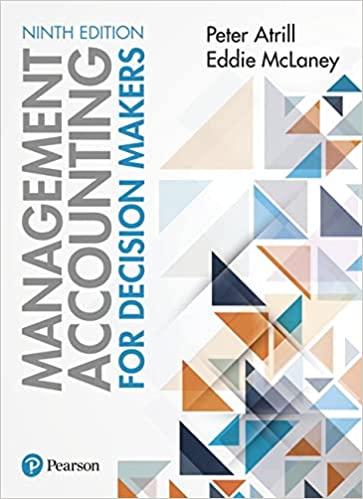Question
Meyer Company was started on November 1 st of the current year, by owner, Annie Meyer. The company is a sole proprietorship that sells a
Meyer Company was started on November 1st of the current year, by owner, Annie Meyer. The company is a sole proprietorship that sells a special line of handmade greeting cards to local stores.
Additional information:
Meyer prepares financial statements on a monthly basis and her fiscal year-end is December 31.
Meyer will prepare closing entries at year-end ONLY.
Meyer Company uses the FIFO perpetual inventory system.
Meyer makes all credit sales on terms of 2/10, n/30.
Meyer records monthly depreciation on all assets using the straight-line method.
Meyer calculates interest based on a 365-day year.
Meyer uses the following accounts:
101 Cash 1
102 Accounts Receivable
103 Allowance for Uncollectible Accounts
105 Inventory Thank You
106 Inventory Birthday
107 Interest Receivable
108 Supplies
110 Prepaid Insurance
120 Prepaid Rent
130 Notes Receivable, Short-term
140 Computers & Furniture
141 Accumulated Depreciation Computers & Furniture
150 Van
151 Accumulated Depreciation -- Van
200 Accounts Payable
203 Interest Payable
220 Notes Payable, Long-term
300 Meyer, Capital
310 Meyer, Withdrawals
400 Sales Revenue
401 Sales Returns and Allowances
402 Sales Discounts
405 Interest Revenue
500 Cost of Goods Sold
506 Rent Expense
507 Depreciation Expense
508 Insurance Expense
509 Utilities Expense
510 Supplies Expense
512 Interest Expense
513 Bad Debt Expense
600 Income Summary
DECEMBER
Sold inventory on account to Patina:
Inventory Item Sales Price per item Quantity Sold
Thank You $3.00 1000
Birthday $3.50 1000
Received a payment from Tidbits for the November 11 sale less the return on November 14.
Paid the amount owed to Cards Etc. from the November 4 purchase.
Meyer granted a sales allowance of $30 to Patina for damaged inventory sold on December 1. Patina decided to keep the damaged inventory.
Received merchandise back from Patina for a mistake in the December 1 shipment. Meyer accidentally included 200 Birthday cards that should have been Thank You cards. So, the actual shipment included 800 Thank You cards and 1200 Birthday cards. (Meyer recorded the cards thinking that she had correctly shipped them.) Patina sent the 200 Birthday cards back for credit they did not want Meyer to resend the correct cards.
Purchased inventory on credit terms of 2/10, n/30 from Greetings!:
Inventory Item Cost per item Quantity Purchased
Thank You $0.45 1000
Sold inventory on account to Occasions:
Inventory Item Sales Price per item Quantity Sold
Thank You $3.00 700
After all of the problems Patina had with its orders from Meyer, it paid off its account in full within the discount period. The payment includes the December 1 purchase, the December 4 allowance, the December 5 return, and the discount.
Paid Greetings! balance in full including the November 21 purchase (no discount) and the December 6 purchase less the discount.
Thingsville asked to transfer its accounts receivable balance into a note. Since Thingsville is a new company, the owners realized that they need more time to pay off their bill. Meyer agreed to a 3-month note receivable at 10% interest. The principal and interest will be due at the maturity date.
Sold inventory on account to Tidbits:
Inventory Item Sales Price per item Quantity Sold
Birthday $3.50 500
After hearing that Occasions was having financial problems, Meyer began to worry about collecting from them. She decided to set up an Allowance for Uncollectible Accounts so that her Balance Sheet would reflect the amount of realistically collectible receivables. She decided that she would probably be able to collect half of the December 7 sale.
Annie Meyer (the owner) made a personal withdrawal of $2,000.
Purchased $60 worth of supplies for cash.
Paid utilities of $300.
Prepare month-end adjusting entries for rent, insurance, depreciation, interest expense, and interest revenue for the month of December. Also, $40 worth of supplies was on hand at the end of the month.
Required:
1. Journalize and post the required journal entries for December.
2. Show the subsidiary balances for A/R and A/P as of December 31. (In other words, prepare a list that shows each customer and each vendor balance separately.)
3. Prepare Meyer Companys Income Statement and Statement of Owners Equity for December. Prepare the Balance Sheet as of December 31.
4. Journalize and post the year-end closing entries on December 31.
5. Prepare a post-closing trial balance at December 31.
Step by Step Solution
There are 3 Steps involved in it
Step: 1

Get Instant Access to Expert-Tailored Solutions
See step-by-step solutions with expert insights and AI powered tools for academic success
Step: 2

Step: 3

Ace Your Homework with AI
Get the answers you need in no time with our AI-driven, step-by-step assistance
Get Started


